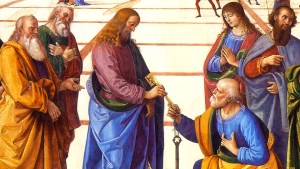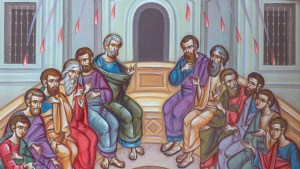Jesus gave one of his apostles, Simon, a new name. He called him, “Peter,” an interesting word that previously was not used as a proper name.
Blessed are you, Simon son of Jonah. For flesh and blood has not revealed this to you, but my heavenly Father. And so I say to you, you are Peter, and upon this rock I will build my church, and the gates of the netherworld shall not prevail against it. I will give you the keys to the kingdom of heaven. Whatever you bind on earth shall be bound in heaven; and whatever you loose on earth shall be loosed in heaven.
Matthew 16:17-19
The Gospels were originally written in Greek and the word used is petros, meaning “rock.” An article on Catholic Answers explains what this word meant in Greek.
As Greek scholars—even non-Catholic ones—admit, the words petros and petra were synonyms in first century Greek. They meant “small stone” and “large rock” in some ancient Greek poetry, centuries before the time of Christ, but that distinction had disappeared from the language by the time Matthew’s Gospel was rendered in Greek. The difference in meaning can only be found in Attic Greek, but the New Testament was written in Koine Greek—an entirely different dialect. In Koine Greek, both petros and petra simply meant “rock.” If Jesus had wanted to call Simon a small stone, the Greek lithos would have been used.
Foundation stone
Furthermore, according to the Ignatius Catholic Study Bible, “evidence suggests that Jesus’ words to Peter were originally spoken in Aramaic. In this language, the word kepha is the equivalent of Peter and denotes a ‘sizeable rock’ — one suitable as a building foundation. This Aramaic name is preserved [in its Latinized form] as Cephas 9 times in the New Testament.”
This is why the Church continues to teach that Jesus appointed Peter as the foundation stone of the Catholic Church.
Simon Peter holds the first place in the college of the Twelve; Jesus entrusted a unique mission to him. Through a revelation from the Father, Peter had confessed: “You are the Christ, the Son of the living God.” Our Lord then declared to him: “You are Peter, and on this rock I will build my Church, and the gates of Hades will not prevail against it.” Christ, the “living Stone,” thus assures his Church, built on Peter, of victory over the powers of death. Because of the faith he confessed Peter will remain the unshakable rock of the Church. His mission will be to keep this faith from every lapse and to strengthen his brothers in it.
CCC 552
Caesarea Philippi: Temple built on a rock
Jesus also said these words at Caesarea Philippi, a city that was literally built on a massive rock!
The Catholic Encyclopediaexplains, “It was given (20 B.C.) by Augustus to Herod, who built there a magnificent temple in honor of the emperor. Soon after, the tetrarch Philip embellished it and dedicated it to his imperial protector Tiberius, whence its new name Caesarea Philippi or Caesarea Paneas.”
This helps give more context to Jesus’ actions, who was pointing out how Simon would be the “rock” for his Church, in contrast to the rock that the temple at Caesarea Philippi was built on.



